牛津广州版英语8年级上册同步全解
- 格式:doc
- 大小:600.00 KB
- 文档页数:67
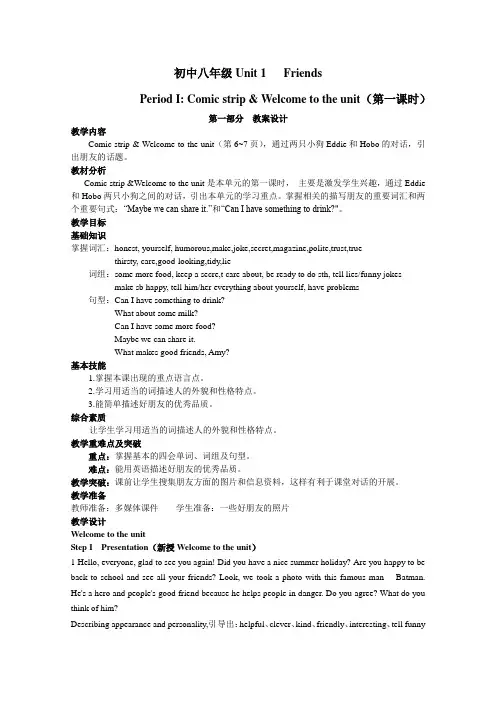
初中八年级Unit 1 FriendsPeriod I: Comic strip & Welcome to the unit(第一课时)第一部分教案设计教学内容Comic strip & Welcome to the unit(第6~7页),通过两只小狗Eddie和Hobo的对话,引出朋友的话题。
教材分析Comic strip &Welcome to the unit是本单元的第一课时,主要是激发学生兴趣,通过Eddie 和Hobo两只小狗之间的对话,引出本单元的学习重点。
掌握相关的描写朋友的重要词汇和两个重要句式:“Maybe we can share it.”和“Can I have something to drink?"。
教学目标基础知识掌握词汇:honest, yourself, humorous,make,joke,secret,magazine,polite,trust,truethirsty, care,good-looking,tidy,lie词组:some more food, keep a secre,t care about, be ready to do sth, tell lies/funny jokes make sb happy, tell him/her everything about yourself, have problems 句型:Can I have something to drink?What about some milk?Can I have some more food?Maybe we can share it.What makes good friends, Amy?基本技能1.掌握本课出现的重点语言点。
2.学习用适当的词描述人的外貌和性格特点。
3.能简单描述好朋友的优秀品质。
综合素质让学生学习用适当的词描述人的外貌和性格特点。
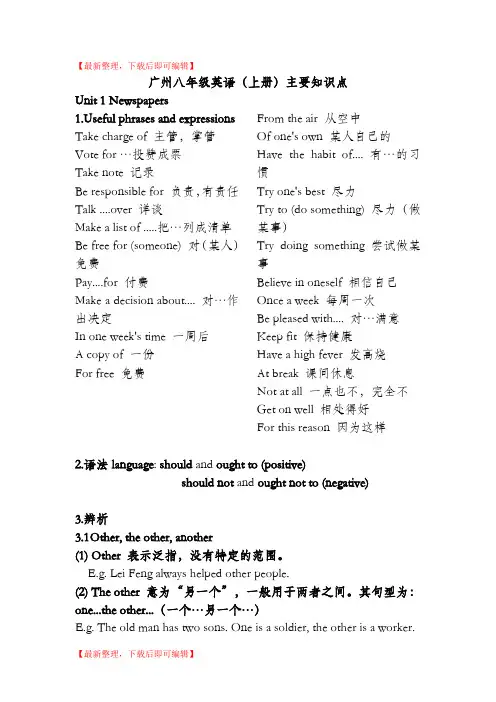
【最新整理,下载后即可编辑】广州八年级英语(上册)主要知识点Unit 1 Newspaperseful phrases and expressions Take charge of 主管,掌管Vote for …投赞成票Take note 记录Be responsible for 负责,有责任Talk ....over 详谈Make a list of .....把…列成清单Be free for (someone) 对(某人)免费Pay....for 付费Make a decision about.... 对…作出决定In one week's time 一周后A copy of 一份For free 免费From the air 从空中Of one's own 某人自己的Have the habit of.... 有…的习惯Try one's best 尽力Try to (do something) 尽力(做某事)Try doing something 尝试做某事Believe in oneself 相信自己Once a week 每周一次Be pleased with.... 对…满意Keep fit 保持健康Have a high fever 发高烧At break 课间休息Not at all 一点也不,完全不Get on well 相处得好For this reason 因为这样2.语法language: should and ought to (positive)should not and ought not to (negative)3.辨析3.1O ther, the other, another(1) Other 表示泛指,没有特定的范围。
E.g. Lei Feng always helped other people.(2) The other 意为“另一个”,一般用于两者之间。
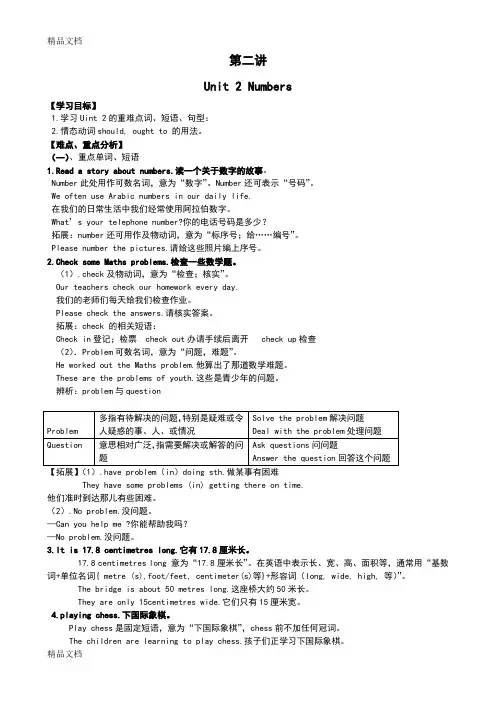
第二讲Unit 2 Numbers【学习目标】1.学习Uint 2的重难点词、短语、句型:2.情态动词should, ought to 的用法。
【难点、重点分析】(一)、重点单词、短语1.Read a story about numbers.读一个关于数字的故事。
Number此处用作可数名词,意为“数字”。
Number还可表示“号码”。
We often use Arabic numbers in our daily life.在我们的日常生活中我们经常使用阿拉伯数字。
What’s your telephone number?你的电话号码是多少?拓展:number还可用作及物动词,意为“标序号;给……编号”。
Please number the pictures.请给这些照片编上序号。
2.Check some Maths problems.检查一些数学题。
(1).check及物动词,意为“检查;核实”。
Our teachers check our homework every day.我们的老师们每天给我们检查作业。
Please check the answers.请核实答案。
拓展:check 的相关短语:Check in登记;检票 check out办请手续后离开 check up检查(2).Problem可数名词,意为“问题,难题”。
He worked out the Maths problem.他算出了那道数学难题。
These are the problems of youth.这些是青少年的问题。
辨析:problem与question【拓展】(1).have problem(in)doing sth.做某事有困难They have some problems (in) getting there on time.他们准时到达那儿有些困难。
(2).No problem.没问题。
—Can you help me ?你能帮助我吗?—No problem.没问题。
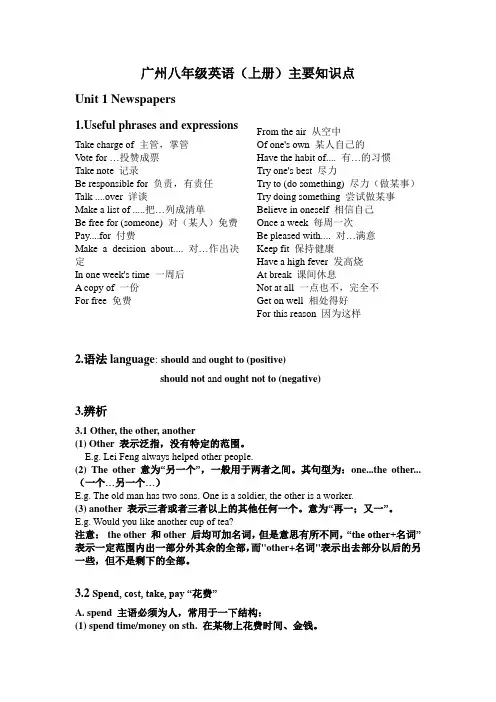
广州八年级英语(上册)主要知识点Unit 1 Newspaperseful phrases and expressions Take charge of 主管,掌管V ote for …投赞成票Take note 记录Be responsible for 负责,有责任Talk ....over 详谈Make a list of .....把…列成清单Be free for (someone) 对(某人)免费Pay....for 付费Make a decision about.... 对…作出决定In one week's time 一周后A copy of 一份For free 免费From the air 从空中Of one's own 某人自己的Have the habit of.... 有…的习惯Try one's best 尽力Try to (do something) 尽力(做某事)Try doing something 尝试做某事Believe in oneself 相信自己Once a week 每周一次Be pleased with.... 对…满意Keep fit 保持健康Have a high fever 发高烧At break 课间休息Not at all 一点也不,完全不Get on well 相处得好For this reason 因为这样2.语法language: should and ought to (positive)should not and ought not to (negative)3.辨析3.1Other, the other, another(1) Other 表示泛指,没有特定的范围。
E.g. Lei Feng always helped other people.(2) The other 意为“另一个”,一般用于两者之间。
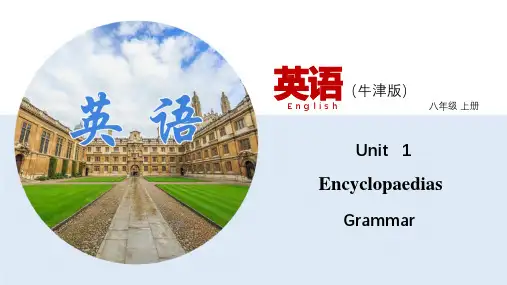
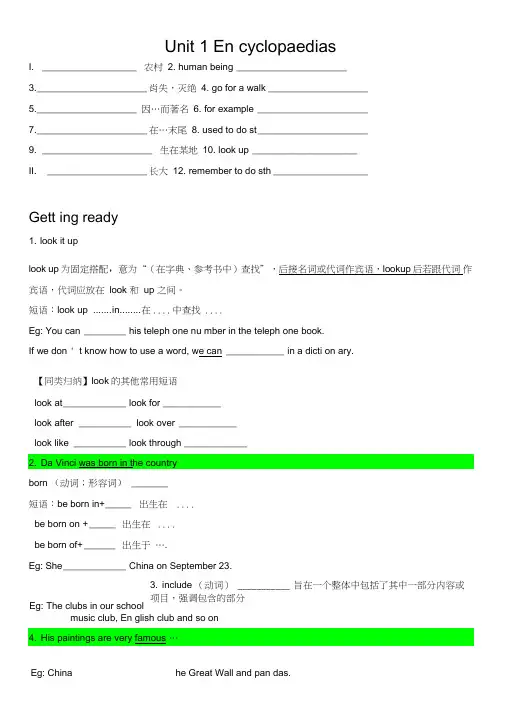
Unit 1 En cyclopaediasI. __________________ 农村2. human being _____________________3. _____________________ 肖失,灭绝4. go for a walk ___________________5. ___________________ 因…而著名6. for example _____________________7. _____________________ 在…末尾8. used to do st _____________________9. _____________________ 生在某地10. look up ____________________II. ___________________ 长大12. remember to do sth __________________Gett ing ready1. look it uplook up为固定搭配,意为“(在字典、参考书中)查找”,后接名词或代词作宾语,lookup后若跟代词作宾语,代词应放在look 和up 之间。
短语:look up ....... i n ........ 在.... 中查找....Eg: You can ________ his teleph one nu mber in the teleph one book.If we don ' t know how to use a word, we can ___________ in a dicti on ary.【同类归纳】look的其他常用短语look at ____________ look for ___________look after __________ look over ___________look like __________ look through ____________born (动词;形容词)_______短语:be born in+ _____ 出生在....be born on + _____ 出生在....be born of+ ______ 出生于….Eg: She ____________ China on September 23.3. include (动词) ___________ 旨在一个整体中包括了其中一部分内容或项目,强调包含的部分Eg: The clubs in our schoolmusic club, En glish club and so onfamous (形容词)be famous as ...... 作为 .... 而著名短语:be famous for因 ... 而著名5. For example _______【易混辨析】It 'He likes sports, _____________ football, basketball and swimmi ng.6. Dino saurs lived on earth more than 60 millio n years before huma n beingsmore than 意为“,相当于over,常与数词连用;反义词为 _____________ 为“_。
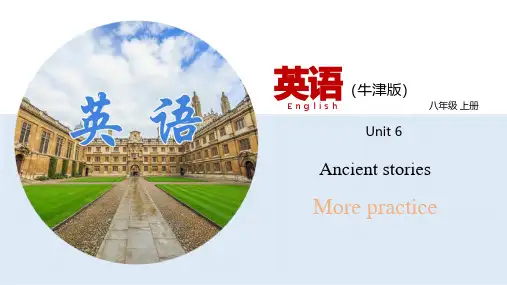
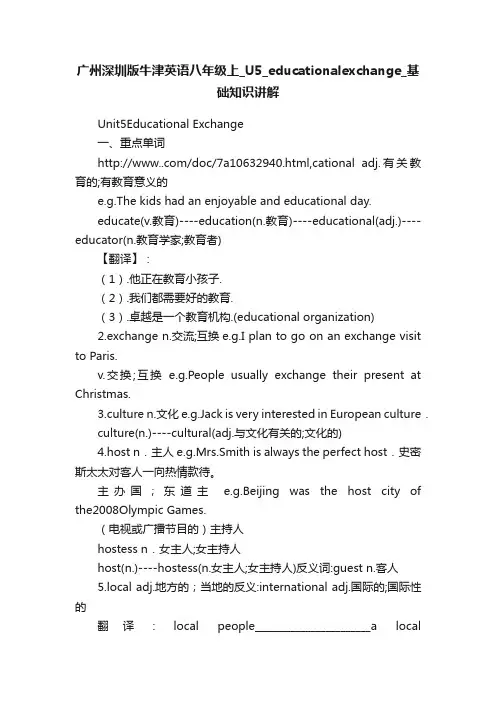
广州深圳版牛津英语八年级上_U5_educationalexchange_基础知识讲解Unit5Educational Exchange一、重点单词/doc/7a10632940.html,cational adj.有关教育的;有教育意义的e.g.The kids had an enjoyable and educational day.educate(v.教育)----education(n.教育)----educational(adj.)----educator(n.教育学家;教育者)【翻译】:(1).他正在教育小孩子.(2).我们都需要好的教育.(3).卓越是一个教育机构.(educational organization)2.exchange n.交流;互换e.g.I plan to go on an exchange visit to Paris.v.交换;互换e.g.People usually exchange their present at Christmas.3.culture n.文化 e.g.Jack is very interested in European culture.culture(n.)----cultural(adj.与文化有关的;文化的)4.host n.主人 e.g.Mrs.Smith is always the perfect host.史密斯太太对客人一向热情款待。
主办国;东道主 e.g.Beijing was the host city of the2008Olympic Games.(电视或广播节目的)主持人hostess n.女主人;女主持人host(n.)----hostess(n.女主人;女主持人)反义词:guest n.客人5.local adj.地方的;当地的反义:international adj.国际的;国际性的翻译:local people_______________________a localnewspaper/school________________________ the local government________________________local(adj.)----location(n.地点)----be located in(v.位于,坐落于)6.glad adj.高兴;愉快 e.g.The people there were really glad to see you.近义词:happy(adj.快乐的;高兴的)----pleased(adj.高兴的;满意的)be glad to do sth高兴做某事I’m glad to see you again.7.chopstick n.筷子e.g.It may be a bit difficult for westerners to use chopsticks.提示:筷子总是成对出现,因此往往用复数形式.“一双筷子”一般说成a pair of chopsticks8.tour v.在……旅游e.g.We toured southern Spain for three weeks.e.g.The Whites spent one month touring around the US.tour(n.旅行;旅游)----tourist(n.游客;观光客)【比较】journey,tour与trip:这三个词均指旅行、旅游。
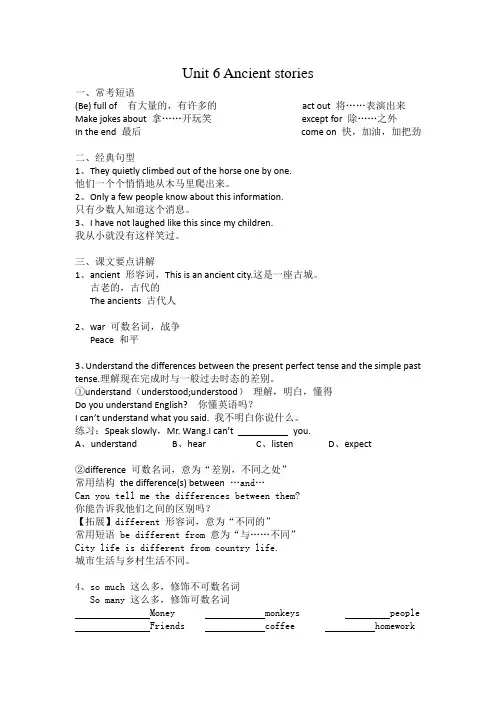
Unit 6 Ancient stories一、常考短语(Be) full of 有大量的,有许多的act out 将……表演出来Make jokes about 拿……开玩笑except for 除……之外In the end 最后come on 快,加油,加把劲二、经典句型1、They quietly climbed out of the horse one by one.他们一个个悄悄地从木马里爬出来。
2、Only a few people know about this information.只有少数人知道这个消息。
3、I have not laughed like this since my children.我从小就没有这样笑过。
三、课文要点讲解1、ancient 形容词,This is an ancient city.这是一座古城。
古老的,古代的The ancients 古代人2、war 可数名词,战争Peace 和平3、Understand the differences between the present perfect tense and the simple past tense.理解现在完成时与一般过去时态的差别。
①understand(understood;understood)理解,明白,懂得Do you understand English? 你懂英语吗?I can’t understand what you said. 我不明白你说什么。
练习:Speak slowly,Mr. Wang.I can’t you.A、understandB、hearC、listenD、expect②difference 可数名词,意为“差别,不同之处”常用结构the difference(s) between …and…Can you tell me the differences between them?你能告诉我他们之间的区别吗?【拓展】different 形容词,意为“不同的”常用短语 be different from 意为“与……不同”City life is different from country life.城市生活与乡村生活不同。
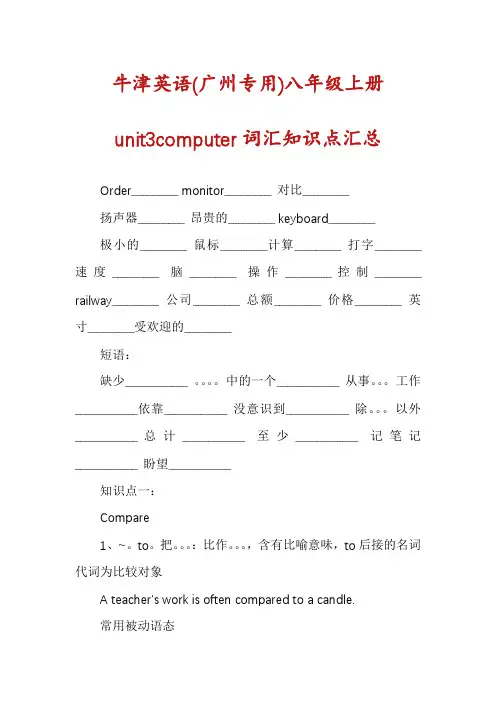
牛津英语(广州专用)八年级上册unit3computer词汇知识点汇总Order_________ monitor_________ 对比_________扬声器_________ 昂贵的_________ keyboard_________极小的_________ 鼠标_________计算_________ 打字_________ 速度_________ 脑_________ 操作_________控制_________ railway_________ 公司_________ 总额_________ 价格_________ 英寸_________受欢迎的_________短语:缺少____________ 。
中的一个____________ 从事。
工作____________依靠____________ 没意识到____________ 除。
以外____________总计____________ 至少____________ 记笔记____________ 盼望____________知识点一:Compare1、~。
to。
把。
:比作。
,含有比喻意味,to后接的名词代词为比较对象A teacher’s work is often compared to a candle.常用被动语态2、~。
with。
:把。
同。
比较,相比较的事物放with前后Please compare your translation with the model translation on the2022年牛津英语(广州专用)八年级上册unit3computer词汇知识点汇总单词默写版,适合教师使用。
blackboard.知识点二:一、频度副词1. 常见的频度副词有以下这些:(画比例图)2. always(总是,一直)3. usually(通常)4. often(常常,经常)5. sometimes(有时候)6. never(从不)2.频度副词的位置:a.放在连系动词、助动词或情态动词后面。
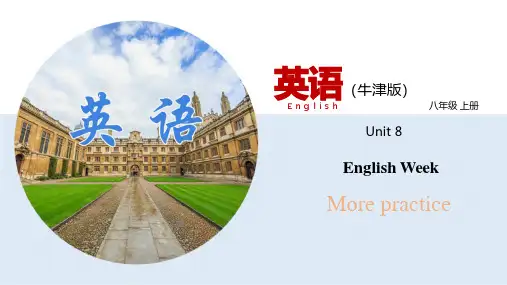
教学过程一、课堂导入二、复习预习教师引导学生以提问、回顾、抽测笔记的形式复习上节课所学的Unit5Reading中相关短语句型及“as…as…”的用法,针对上节课的作业进行讲评、订正、答疑,并通过对游学生活的交流进入本课新内容。
三、知识讲解知识点1:词汇短语详解cate v.教育(1)Educate-educated-educated-educating(2)Educate(v.)-education(n.)-educational(adj.)e.g. 他已经做教育三年了.He has educated for three years.这本书具有教育意义.This book is educational.2. experience v./n.经历体验;经验(1)Experience-experienced-experienced-experiencing(2)Experience v.—experience n.(不可数名词)e.g. 我们已经经历了工作三年了。
We have experienced work for three years。
我们已经工作三年,并且拥有丰富的经验。
We have worked for three years and own rich experience。
3. already adv.已经用于现在完成时e.g.我已经学习英语一个月.I have already learnt English for one month.4. yet 仍未;尚未adv.用于现在完成时e.g.我还没有完成作业I have not finished my homework yet.5. introduce v.介绍(1)Introduce-introduced-introduced-introducing(2)Introduce(v)—introduction(n)e.g. 请允许我自我介绍一下.Please allow me to introduce myself.6. respect v.尊重(1)Respect-respected-respected-respecting(2)Respect(v)—respect(n)—respective(adj)e.g. 请尊重老人.Please respect the old.他很尊敬老师.He respects teachers so much.7. success n.成功(1)success(n)—succeed(v)—successful(adj)e.g. 他成功了.He succeeded .他是成功的.He is successful.他获取很大的成功.He got lots of success.知识点2 课文典型短语1. at first 起初e.g. 起初我并不喜欢你.I don’t love you at first.起初我并我知道这个秘密.At first, I don’t know this secret.2.so far 到目前为止e.g. 我已经见过很多动物了,到目前为止.I have seen lots of animals so far. 我已经看了三本书到目前为止.I have read three books so far.3.a bit of 小量与a little一样后接不可数名词e.g. A bit of water 少量的水A bit of milk少量的牛奶A bit of money 一点钱4.introduce...to...使...初次了解Introduce A to B 把A介绍给Be.g. 你可以介绍你的同学给我吗? Can you introduce your classmate to me?e over(to)从...到...e.g. 你什么时候来中国的?When did you come over to China?我从美国到中国来.I was from America and came over to China.6. try to do sth. 努力做某事try doing sth. 尝试做某事e.g. I will try to help you. 我将会尽力帮助你。
第二讲Unit 2 Numbers【学习目标】1•学习Uint 2的重难点词、短语、句型: 2•情态动词should, ought to 的用法。
【难点、重点分析】(一)、重点单词、短语1. Read a story about numbers.读一个关于? Number 此处用作可数名词,意为“数字”。
Number 还可表示“号码”。
We often use Arab i c numbers i n our daily I i fe.在我们的日常生活中我们经常使用阿拉伯数字。
What' s your te I ephone number?你的电话号码是多少?拓展:number 还可用作及物动词,意为“标序号;给……编号”。
PI ease number the p i ctures.请给这些照片编上序号。
2. Check some Maths problems.检查一些数学题。
(1) .check 及物动词,意为“检查;核实”。
Our teachers check our homework every day.我们的老师们每天给我们检查作业。
PI ease check the answers.请核实答案。
拓展:check 的相关短语:Check in 登记;检票 check out 办请手续后离开check up 检查(2) . Problem 可数名词,意为“问题,难题”。
He worked out the Maths prob I em.他算出了那道数学难题。
These are the prob I ems of youth.这些是青少年的问题。
辨析:problem 与 question【拓展】(1) . have problem ( i n) doing sth.做某事有困难They have some prob Iems (in) getting there on time. 他们准时到达那儿有些困难。
八年级英语上册Unit 1 Encyclopedi aPart 1 一、单词拼写。
1.Recently..... hav.foun.tha.dog.ar.clevere.tha.cats.2..a.sur.h.ha.th...... t.finis.drawin.th.hors.soon.3.Li.Hua.i..famou......4.D.Vinc.wa..... i.th.countryside.5.Fro.a.earl.age.h.showe.grea.......an......ability.6.A.h.gre.older.h......t.d.man.differen.things.7.Hi.......ar.ver.famous.8.H.als.ha.man.......9.Fo.example.hi.noteboo...... som.interestin.drawing.o.flyin.machines.10.Thoma.Ediso.i..grea........i.th.world..根据句子的意思, 用所给的单词的适当形式填空。
1.M.favourit.subjec.i.... .an..wan.t.b......i.th.future.(science.2.Ca.yo.tel.m.wh.....th.telephone.(invention.e.fro......h.ca.spea......(Italy.4.Bil.i.smart.bu.hi.brothe.i.eve.mor......(intelligence.5.Susa.like.....(go.fo..wal.afte.supper.6.Th.littl.bo.learn.....(wash.clothe.b.himself.7.Th.Mon.Lis.i.on.o.D.Vinci’.famou......(pain.8.H.wa.....(bear.i.Shenzhe.i.1989.9.Mozar.wa..grea......(music.i.th.world.二、10.Th.pictur.o.th.wal.i..goo....(art.work..三、翻译句子。
Unit 2 Numbers1. 许下/违背诺言_____________________2. the rest of_____________________3. 开始意识到_____________________4. A long time ago_____________________5. 从那以后_____________________6. play chess_____________________7. copy down_____________________ 8. follow one’s advice_____________________9. 发生_____________________ 10. 想要做某事_____________________11. 不但…而且…_____________________ 12. make sb do sth_____________________13. 禁不住做某事_____________________ 14. make good use of_____________________15. 命令某人做某事_____________________ 16. all year around_____________________Step One Reading& Listening1.Check some Maths problems.【考点聚焦】(1)check 及物动词,“检查,核实”(2)【拓展】check 的相关短语(3)check in__________ check out__________ check up___________I will meet Jane at the station, please _________ what time she will arrive.A. countB. chooseC. checkD. Catch(2)problem可数名词,“问题,难题”辨析:problem 与question(1)have problems in doing sth. 做某事有困难(2)_________________. 没问题。
教学过程一、课堂导入We should keep quiet in class.我们应该在课堂上保持安静。
We shouldn’t make noise in class.我们不应该在课堂上制造噪音。
二、复习预习教师引导学生以提问、回顾、抽测笔记的形式复习上节课所学的Unit7中条件状语从句的用法,针对上节课的作业进行讲评、订正、答疑,并通过对情态动词should的用法拓展进入本课新内容。
三、知识讲解知识点1:词汇短语详解petition n. 比赛; complete v.竞赛,对抗e.g. I have to change my approach, the competition is too good now.我得改变我的方法,竞争对手现在太好了。
2. confidently adv. 自信地,安心地; confident adj. 自信的,自负的e.g. I said confidently. 我自信地说道。
3. communicate vi. 通讯,传达,相通,交流,感染; vt. 传,感染,显露e.g. He was never good at communicating with the players.他从不擅长和队员沟通。
They successfully communicate their knowledge to others.他们成功地把他们的知识传达给别人。
4.suggestion(s)n. 建议(可数); suggest v.建议e.g. I suggest trying once more. 我建议再试一次。
Could you suggest someone to advise me how to do this?你能推荐一个人来建议我怎么做这件事吗?5. chance n. 机会,机遇,概率; vt. 偶然发生;冒……的险; vi. 碰巧;偶然被发现e.g. Do you think they have a chance of beating Australia?你认为他们有可能击败澳大利亚队吗?He had met Mr. Maude by chance.他曾与莫德先生邂逅。
目录Unit 1 Newspapers (2)Unit 2 Detectives and crimes (8)Unit 3 Modern machines (16)Unit 4 Historical stories (22)Unit 5 Strange creatures (27)Unit 6 Jobs (34)Unit 7 Environment (42)期中测试 (49)期末测试 (51)参考答案 (53)Unit 1 Newspapers单元目标1. 句子中注意suggest的应用。
2. 掌握spend + 时间/ 钱+ on sth / (in) doing sth.3. 虚拟语气在宾语从句中的运用。
Part 1要点精讲一、短语1.hold a meeting 开会2.decide to do 决定做某事3.suggest doing sth 建议做某事4.elect …to be/as…选举…作为…5.agree to do sth 同意做某事6.agree with sb. 同意某人7.agree on sth. 就某件事达成共识8.make a decision about…对……作出决定9.take charge of= be in charge of 主管;掌管10.vote for / against 投票赞成;投票否决11.take notes 做记录;做笔记12.be responsible for 负责;有责任13.talk … over 详谈某事14.make a list of 把……列成清单15.be free for sb. 对(某人)免费16.pay for 付费(买…)17.in one week’s time 一周后18. a copy of 一份19.for free 免费的20.from the air 从空中21.of one’s own 某人自己的22.in all 总计,合计23.form a circle 形成一个圈24.at the stall 在一个摊位25.in pairs 成双成对26.belong to 属于27.in the newspaper 在报纸上28.have sb. do sth. (=make sb. do sth.) 使某人做某事29.believe in oneself 相信自己30.give sb. advice 给某人建议31.keep fit 保持健康32.be pleased with 对…满意33.be interested in 对…..感兴趣34.have the habit of (doing sth) 有……的习惯35.try one’s best to do sth 尽力做某事36.try to do sth 尽力做某事37.once a week 每周一次38.have a high fever 发高烧39.at break 课间休息时40.get on well (with sb) (和某人)相处好41.for this reason因为这样42.keep on doing 继续做某事43.thanks for doing sth 谢谢做某事44.be the same as 与…一样45.be different from 与…不同46.not a bit = not at all 一点儿都不47.not a little = very (much) 很、非常48.leave + sth. + 地点:把…留在…49.forget + sth. : 忘记…50.feel sick/lonely 感到不舒服/孤单51.on one’s/the way (to) 去…...的路上52.at the end of… 在...末尾53. in the end= at last 最后,终于二、词汇的变化记忆edit(v.)-editor(n.)-edition(n.) decide(v.)-decision(n.) suggest(v.)-suggestion conclude(v.) – conclusion(n.) consider(v.) – consideration(n.) elect (v) - election confident-confidence include(v)-including(prep) enjoy(v)- enjoyable(adj) fun(n) – funny (adj) design(n/v) – designer(n.)三、重点解析1. alone / lonely:alone,“独自一人;单独”不含感情色彩。
可当形容词,但只在系动词后作表语:Jack is alone. 杰克是单身。
The old woman is alone in the house. 那位老妇一个人在屋里。
可当副词,修饰动词:She lives alone. 她独居。
Can you move the stone alone? 你能独自搬动那块儿石头吗?Dick is walking on the beach alone. 狄克独自在海滩漫步。
(注意:不可说very alone. 但可说very much alone. 是特例)lonely“孤独的;寂寞的”带有伤感色彩。
只当形容词。
可在系动词后作表语:The old man is lonely.这位老人是孤独的。
He has many relatives, but he feels lonely. 他有很多亲戚,但感到孤独。
(lonely 和心理感受有关,而alone和心理感受无关。
)也可在名词前作定语:a lonely person一位孤独的人a lonely village一个偏僻的村庄(alone不可作定语)2. I suggest (that) we go out to eat.(宾语从句的that不充当成分,可省略)。
虚拟语气在宾语从句中的运用。
当suggest作“建议,提议”讲而又表示与现实相反或难以实现时,后面的从句用虚拟语气,即suggest that+(should) do…(should可省略)。
如:We suggested that we (should) have a meeting.注:当suggest作“表明”讲时,后面不用虚拟语气。
如:All the evidence suggests (that) he stole the money.(所有证据都表明是他偷了钱)。
值得说的是,注意若that省略了不太容易看出句子结构,很多人就以为suggest sb do是个固定形式,这样记也没什么不可,但记得that 和should通常被隐藏起来的,最主要的是…sb.不是宾格,而是主格,做that引导的后面的从句的主语的…像上面的he千万别写成him.类似的词有desire insist order request require advice demand等等…典型例题【例1】The boy always stays there for _______ .A. one and half hourB. one and a half hourC. one and half hoursD. one and a half hours【答案】D【解析】表示“整数+一半”的时间段有两种方法:①基数词+a half+名词复数②不定冠词或基数词+名词+a half 如:“一个半小时”可译为:one and a half hours 或an/one hour and a half。
【例2】The teacher is so kind that he is _________ his pupils.A.popular by B.welcome by C.welcomed to D.popular with 【答案】D【解析】sb./sth.be popular with sb.意为“某人或某事深受……的欢迎/某人或某事深为……所喜爱”。
针对训练1.The tower on the top of the hill_____________. the beauty of the lake.A.adds up to B.adds to C.adds up D.adds2.She tried to speed __________ the car, but it was impossible, for it was too old, and it could only run__________ the speed of 20 kilometres an hour.A.up, at B.up, to C./, by D./, with3.He stood at the beach, his eyes ___________ the ships and the seagulls on the sea.A.fixing at B.fixed upon C.fix, on D.to fix, at4.The artist is said to study in the US in his twenties. ________ 5.How beautiful this lake is! I'll sit here, and you, please take a photograph for me.________Part 2要点精讲一、语法/句型1.it is adj of sb to do sth & it is adj for sb to do sth2.try doing sth & try to do sth3.at the end of, in the end, & by the end4.leave & forget5.include & including6.believe in & believe7.It’s fun + doing sth.8.S+V+P 主系表结构9.pay, take, spend &cost10.lonely & alone11. a bit & a little12.in & after + 时间段13.take part in, join in & join14.of one’s own & on one’s own二、重点精讲1. take, cost, pay, spend(1) It + take + sb + some time + to do sth.It took us half an hour to cut down the tree.(2) 物+cost+sb+钱:The bag cost me thirty yuan. (cost, cost, cost)若cost后无sb, 则译作―价钱是‖:The bag costs 30 Yuan.(3) 人+ pay +sb + 钱+ for sth:I paid the seller 200 Yuan for the bike. (pay, paid, paid). (pay后所加内容可视具体情况取舍。